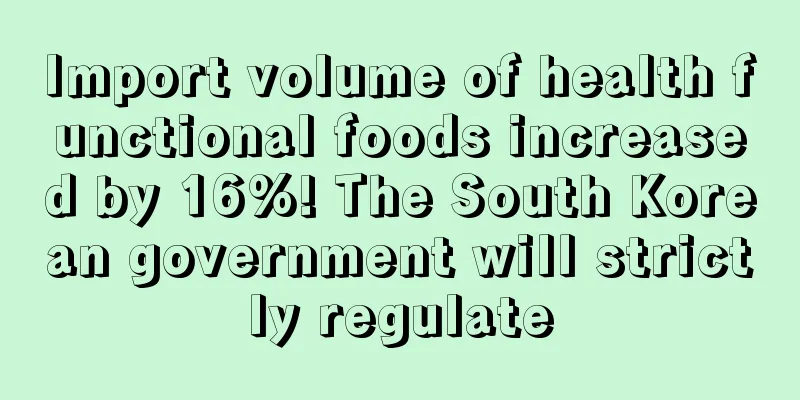Import volume of health functional foods increased by 16%! The South Korean government will strictly regulate

|
According to a survey, the COVID-19 pandemic spread across the world last year, and South Korea was also greatly affected. People began to pay attention to their own health, and the proportion of food consumption increased, especially the number of imported health functional foods, utensils, containers and packaging increased significantly .
According to the "Food-Related Import Trends in 2020 " released by the Korea Food and Drug Safety Administration on the 12th , the import value of health functional foods last year was US$ 911 million , an increase of 16.1% from US$ 786 million last year .
In addition, imports of utensils, containers and packaging amounted to US$2.186 billion, an increase of 6.6% from US$ 2.051 billion in the same period last year .
As the import value of aquatic products (7.7%) and livestock products (6.0%) decreased compared with the previous year , processed food (2.1%) and food additives (9.3%) increased . It is reported that the total import value of food-related products (US$27.343 billion) last year decreased by 0.5% compared with the previous year.
In terms of import value from different countries , the United States accounted for the largest amount at $6.24 billion , followed by China, Australia, Vietnam and Russia. It is reported that the import value from these five countries accounted for 56.6% of the total import value.
There are 1,859 imported commodities . In terms of price , beef , pork and refined raw materials for processing are the top commodities. In terms of weight, wheat, refined raw materials for processing and corn are the top commodities .
It is reported that the import volume of palm oil is 11 times that of the previous year . The Korea Food and Drug Safety Administration analyzed that the import volume of palm oil has increased significantly due to the increase in domestic demand for instant noodles and the increase in ramen exports .
In addition, due to the impact of the epidemic, the import volume of Chinese kimchi (8.4%), Japanese beer (86.0%), and Japanese sea squirt (37.3%) decreased.
It is reported that the scale of the Korean health care product market is continuously expanding , and the government is constantly improving the regulatory system to avoid management loopholes, strictly controlling product quality, and regularly spot checking and punishing unqualified products and manufacturers, so that manufacturers dare not relax on quality. Therefore, the confidence of Korean health care products consumers has always been among the best in the world.
Product quality is a topic of common concern to consumers. Faced with increasingly fierce market competition, sellers must focus on quality, choose products that meet national standards, be responsible to consumers, and avoid a credibility crisis caused by a desire for quick success and instant benefits.
South Korea Health Products consumer |
Recommend
After abandoning eBay Korea, Kakao turns its attention to young e-commerce platforms
Kakao, which operates South Korea's largest m...
What is Yellow Pages Scraper? Yellow Pages Scraper Review, Features
Yellow Pages Scraper is a very powerful foreign tr...
Online sales exceed $6 billion, Gap's e-commerce business grows rapidly
Due to the impact of the new coronavirus , a larg...
What is Matson Steamship? Matson Steamship Review, Features
Matson Navigation Company, Inc. (hereinafter refer...
What is Chubbies Shorts? Chubbies Shorts Review, Features
Chubbies Shorts is a men's shorts brand founde...
Amazon's market value could reach 3 trillion US dollars in three years, and BCI's official website removed the "Statement to Boycott Xinjiang Cotton"
BCI official website removes "Statement on B...
Cainiao's first air cargo center is located in Shenzhen, and it has joined hands with Shenzhen Airport to increase cross-border package processing efficiency by 30%.
On April 3, Cainiao signed a cooperation agreemen...
Attention! Amazon launches new customer support tool
Today, Amazon announced that it will launch a new...
Outdoor camping is popular. Tmall camping consumption has doubled for two consecutive years
According to Tmall, the scale of camping supplies...
What is Xentral ERP? Xentral ERP Review, Features
Xentral ERP is a lean ERP cloud software that bund...
Canadian sportswear brand Lululemon's stock price soars!
According to foreign media reports, the stock pri...
What is Standard Certification? Standard Certification Review, Features
Shenzhen CeBiao Certification Technology Service ...
What is MoeLa Information Technology? MoeLa Information Technology Review, Features
Guangzhou Mengla Information Technology Co., Ltd. ...
Luggage becomes a hot product in India as revenge travel increases
According to the latest news, Indian e-commerce g...
Amazon decides to postpone new FBA delivery process
Amazon previously asked sellers to prepare to swi...









